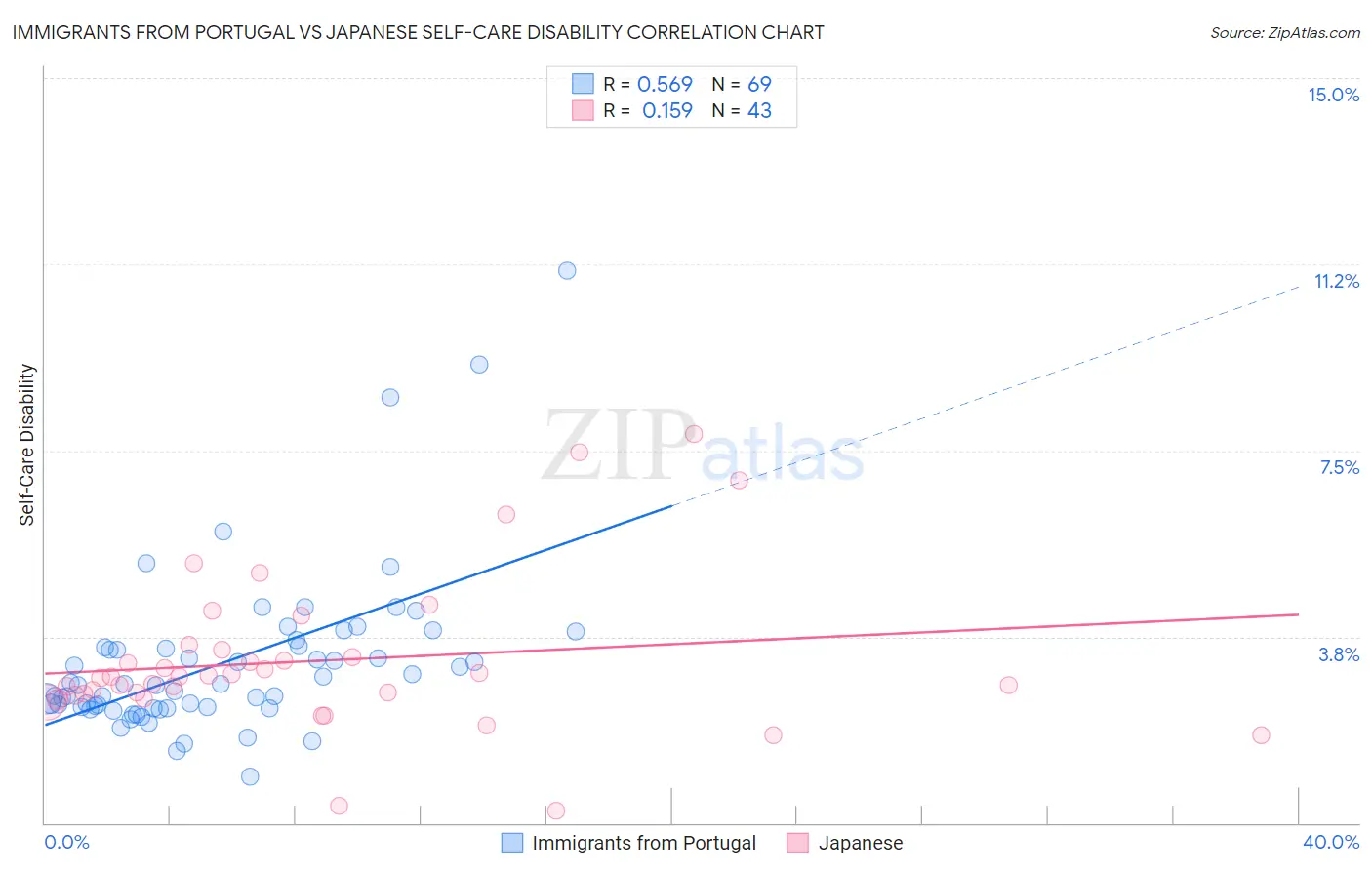Immigrants from Portugal vs Japanese Self-Care Disability
COMPARE
Immigrants from Portugal
Japanese
Self-Care Disability
Self-Care Disability Comparison
Immigrants from Portugal
Japanese
2.8%
SELF-CARE DISABILITY
0.0/ 100
METRIC RATING
296th/ 347
METRIC RANK
2.7%
SELF-CARE DISABILITY
0.1/ 100
METRIC RATING
276th/ 347
METRIC RANK
Immigrants from Portugal vs Japanese Self-Care Disability Correlation Chart
The statistical analysis conducted on geographies consisting of 174,707,428 people shows a substantial positive correlation between the proportion of Immigrants from Portugal and percentage of population with self-care disability in the United States with a correlation coefficient (R) of 0.569 and weighted average of 2.8%. Similarly, the statistical analysis conducted on geographies consisting of 249,013,660 people shows a poor positive correlation between the proportion of Japanese and percentage of population with self-care disability in the United States with a correlation coefficient (R) of 0.159 and weighted average of 2.7%, a difference of 2.9%.

Self-Care Disability Correlation Summary
| Measurement | Immigrants from Portugal | Japanese |
| Minimum | 0.93% | 0.26% |
| Maximum | 11.1% | 7.8% |
| Range | 10.2% | 7.6% |
| Mean | 3.2% | 3.3% |
| Median | 2.8% | 2.9% |
| Interquartile 25% (IQ1) | 2.3% | 2.6% |
| Interquartile 75% (IQ3) | 3.6% | 3.5% |
| Interquartile Range (IQR) | 1.2% | 0.91% |
| Standard Deviation (Sample) | 1.7% | 1.6% |
| Standard Deviation (Population) | 1.7% | 1.5% |
Demographics Similar to Immigrants from Portugal and Japanese by Self-Care Disability
In terms of self-care disability, the demographic groups most similar to Immigrants from Portugal are Barbadian (2.7%, a difference of 0.43%), Belizean (2.7%, a difference of 0.57%), Blackfeet (2.7%, a difference of 0.57%), Central American Indian (2.7%, a difference of 0.58%), and Guyanese (2.7%, a difference of 0.73%). Similarly, the demographic groups most similar to Japanese are Immigrants from Ukraine (2.7%, a difference of 0.060%), Ottawa (2.7%, a difference of 0.14%), Iroquois (2.7%, a difference of 0.24%), Hispanic or Latino (2.7%, a difference of 0.26%), and Immigrants from Iraq (2.7%, a difference of 0.42%).
| Demographics | Rating | Rank | Self-Care Disability |
| Japanese | 0.1 /100 | #276 | Tragic 2.7% |
| Immigrants | Ukraine | 0.1 /100 | #277 | Tragic 2.7% |
| Ottawa | 0.1 /100 | #278 | Tragic 2.7% |
| Iroquois | 0.1 /100 | #279 | Tragic 2.7% |
| Hispanics or Latinos | 0.1 /100 | #280 | Tragic 2.7% |
| Immigrants | Iraq | 0.0 /100 | #281 | Tragic 2.7% |
| Apache | 0.0 /100 | #282 | Tragic 2.7% |
| Delaware | 0.0 /100 | #283 | Tragic 2.7% |
| Fijians | 0.0 /100 | #284 | Tragic 2.7% |
| Jamaicans | 0.0 /100 | #285 | Tragic 2.7% |
| French American Indians | 0.0 /100 | #286 | Tragic 2.7% |
| Immigrants | Jamaica | 0.0 /100 | #287 | Tragic 2.7% |
| Immigrants | Barbados | 0.0 /100 | #288 | Tragic 2.7% |
| Africans | 0.0 /100 | #289 | Tragic 2.7% |
| Cubans | 0.0 /100 | #290 | Tragic 2.7% |
| Guyanese | 0.0 /100 | #291 | Tragic 2.7% |
| Central American Indians | 0.0 /100 | #292 | Tragic 2.7% |
| Belizeans | 0.0 /100 | #293 | Tragic 2.7% |
| Blackfeet | 0.0 /100 | #294 | Tragic 2.7% |
| Barbadians | 0.0 /100 | #295 | Tragic 2.7% |
| Immigrants | Portugal | 0.0 /100 | #296 | Tragic 2.8% |